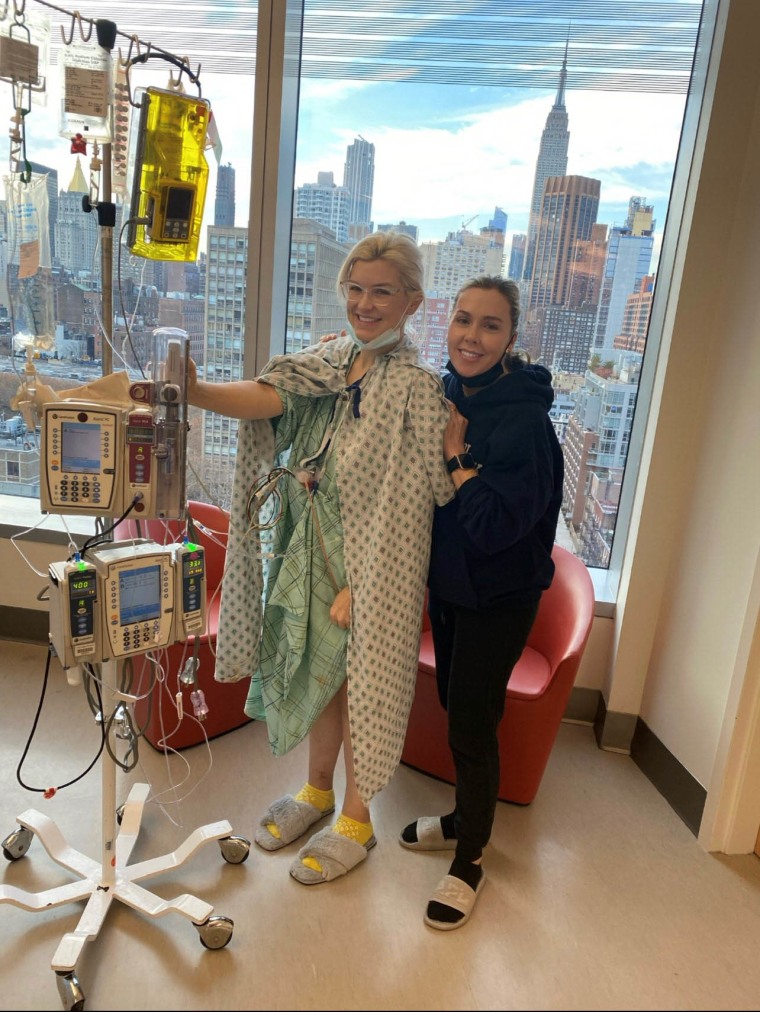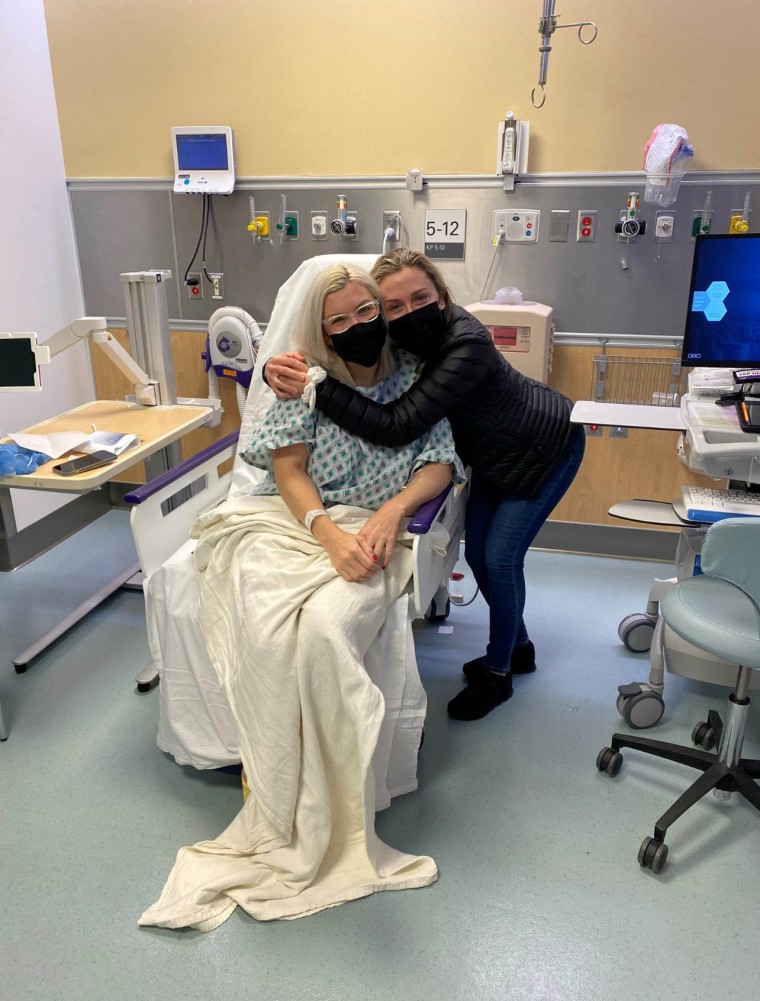In 2017, Katie Sackett began experiencing “strange abdominal cramps,” and wondered if something was wrong. She didn’t have any family history of gastrointestinal problems so she turned to a DNA test to see if it would identify there was a genetic reason for her worsening health. The DNA test didn’t reveal a hidden genetic cause, but it did uncover another secret — Sackett had previously unknown brothers and sisters who were conceived using the same sperm donor.
“I was having a flare-up of my symptoms and I was going to be diagnosed with inflammatory bowel problems,” Sackett, 40, of Beaverton, Oregon, tells TODAY.com. “(At the same time) I was getting the results saying you have half-siblings, and I was getting bombarded with questions from my half-siblings like, ‘What kind of life do you live?’ ‘Do you have any medical problems?’”
At first, Sackett felt wary about answering. Then one of her newly discovered half-sisters, Nichole Bambanian sparked a conversation when she said, “A lot of us have bowel problems. If you ever have bowel problems let us know.”
Bambanian, Kristin Geffen and Anna Nevares, who all found one another through DNA testing, all also have inflammatory bowel disease. Sackett has Crohn’s disease while Bambanian, Geffen and Nevares have ulcerative colitis (UC). Since find one another they have become a support group of four, encouraging one another and finding the best treatments.
“(When) I see them in the thick of it … I’m like I have to be there for you,” Nevares, 42, of Oceanside, California, tells TODAY.com. “You’re my sisters. Even though we’re half-sisters, I’m going to be there because just having someone there who understands it, who has been through it, was so helpful.”
Grappling with IBD alone, then together
When Bambanian was 14, she began having symptoms of ulcerative colitis and it became so severe that she eventually underwent surgery for a j-pouch surgery, a procedure where doctors remove the patient’s colon and rectum and create an internal pouch using the small intestine, according to the Crohn’s and Colitis Foundation. People normally undergo this treatment after all other therapies fail to help. Even with the surgery, she’s faced many complications. Ulcerative colitis comes with a variety of gastrointestinal symptoms and the stigma about discussing such topics means patients suffer in silence. But when she met Nevares, she immediately felt a connection.
“She had already had the surgery, the j-pouch surgery, and I had already had the j-pouch surgery. We were like, ‘Whoa this is so crazy, you have ulcerative colitis, and you have a j-pouch, and you got sick in high school and I got sick in high school,'” Bambanian, 44, Chandler, Arizona, tells TODAY.com. “We were just going back and forth and talking about surgeons and our procedures.”

Bambanian had her surgery in 2002, and Nevares had hers in 2006. Yet, their paths diverged. Nevares has had few complications since undergoing her procedure.
“For 12 solid years I took not one pill and had very minimal changes (to my health) and I was fine,” Nevares says. “Then I got my first bout of pouchitis.”
Bambanian has had several health problems, including several bouts of pouchitis, an inflammation of her j-pouch, and had needed various procedures and treatments. Nevares only recently started having some issues with her pouch.
In some ways Geffen and Sackett’s stories run parallel, too.
“(Our onset) was after children were born and we were healthy —until you’re not,” Geffen, 42, of Sun Valley, Idaho tells TODAY.com. “To have sisters that have been through it before, they knew what tests to ask for, what doctors we should go to (has been helpful).”
Bambanian and Nevares stepped in when Geffen and Sackett felt too ill to speak up for themselves.
“When you’re really sick and you’re in the hospital … you can’t be your own advocate,” Geffen says. “I can’t imagine Katie and I struggling through this alone.”
Bambanian participates in online groups and with the Crohns and Colitis Foundation and she kept hearing about a doctor Dr. Feza Remzi. Patients thought he was “the best.” When it became clear that Geffen and Sackett might also benefit from a j-pouch, they decided to see Remzi together.
“We had surgery on the same day by the same surgeon,” Sackett says.
Even though Sackett has Crohn’s disease, it functions a little differently and that’s why their doctor thought a j-pouch might benefit her. Undergoing surgery on the same day as Geffen further connected the siblings, who learned they shared more than just inflammatory bowel disease.
“We have a very tight knit bond. We are both advanced practice nurses and we both work in the same field of anesthesiology,” Sackett says. “You have more of a connection with somebody who has the same interest as you do, the same job as you do, and you also happen to look alike. That’s just really really cool.”

Three of the four sisters, everyone except Nevares, had surgery with Remzi.
Ulcerative colitis and j-pouch surgery
“There are two components of inflammatory bowel disease — one of them is ulcerative colitis, the other is Crohn’s disease,” Remzi, director of the Inflammatory Bowel Disease Center at NYU Langone Health, tells TODAY.com. “About 3 million people — 50/50 divided —has ulcerative colitis or Crohn’s disease in our country.”
In both conditions, something sparks an immune response that causes inflammation. In ulcerative colitis the inflammation occurs in the colon and rectum, also known as the large intestine, while Crohn’s inflammation can occur anywhere, but it mostly likely occurs in the small bowel, he says.
“We don’t know the exact cause,” Remzi says. “It’s an immunological disorder that triggers that creates the inflammation.”
What “triggers” the inflammation remains unclear. There are genes that contribute to someone being more likely to have the condition, he says, but not one gene seems to be controlling it and genetic association is “around 10% to 20%” of people with it.
“It doesn’t necessarily mean that someone who has a family history is going to get it,” he says.
Symptoms of UC include:
- Bloody bowel movements
- Diarrhea
- Urgency to defecate
- Frequency of defecation
“It can be a horrific and very humbling,” Remzi says. “Patients with ulcerative colitis might have (to wear) diapers or have accidents in the middle of nowhere that can be very humiliating and take their dignity and complement their stigma.”
Sadly, lifestyle changes do not “impact it too much,” and patients can take biologic medications that help “decrease the inflammation in the gut.”
“That translates into decreased frequency and urgency and mucosal healing in the large intestine, in colon or rectum,” he says. “Unfortunately … 25 to 30% of these patients do not respond and ultimately require surgery.”
The surgery, a j-pouch, requires two to three procedures. First, Remzi removes the colon and rectum and gives the patient an ileostomy for six months to help the body recover. Then he creates a new “internal reservoir rectum” and connect it to the anus. For many patients, this procedure feels transformative. This means that patients do not need an external ostomy bag and can use the bathroom when they defecate. And, many experience fewer symptoms.
“In our hands, the success rate for this procedure for the patients who can have a better quality of life is over 95%,” Remzi says. “Some patients say hey wish they had the procedure done much earlier.”

Raising awareness
Having inflammatory bowel disease often feels like an invisible illness. People often don’t consider what it’s like to live with such urgency that finding a bathroom is an emergency. Many think the sisters are healthy because they "look fine on the outside."
“It’s an invisible disease and it’s something that has a stigma around it,” Bambanian says. “It’s important for people to feel like they are not alone and there are other people out here (with it).”
Nevares notes that many people take medications for their UC and live completely normal lives. She and her sisters are unique, but she hopes that by sharing their stories people with more severe cases feel less alone.
“It’s a very small subset that go on to need a j-pouch. That’s what I think is so remarkable about our story is that we have such severe cases,” she says. “Some people will get a diagnosis and take a medication for a couple of weeks and never have symptoms again.”
For Geffen, who was raised as an only child, having siblings feels amazing but it’s even better that they understand her health challenges.
“You can’t even visualize or empathize what it means until you’re living in it, which is hard to say, but true,” Geffen says. “Having sisters for me, being an only child … it’s beyond magical.”
